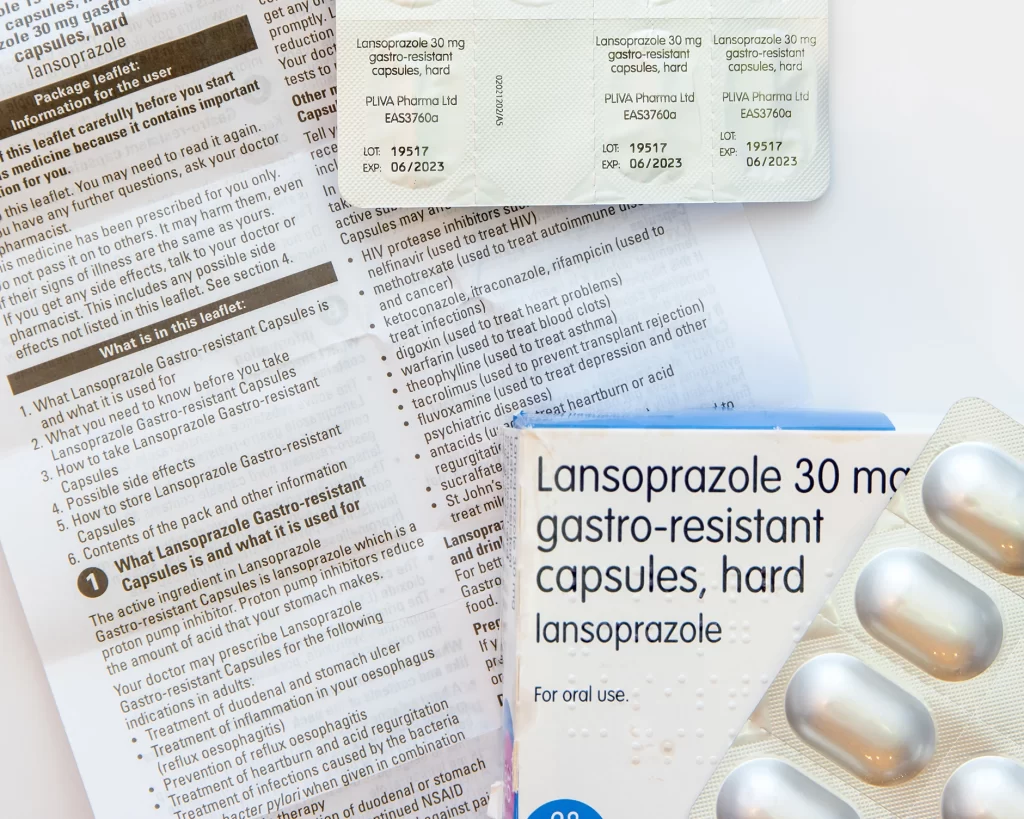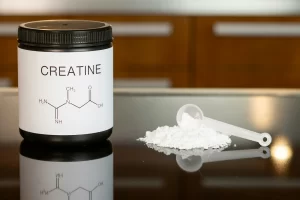If you’ve ever experienced heartburn or acid reflux, there’s a chance you’ve heard of proton pump inhibitors. For many people living with stomach problems, they’re life-changing.
Some scientists, however, have theorized that proton pump inhibitors might be linked to memory problems like dementia.
Here, I explain what’s known about this matter.
What is a proton pump inhibitor?
A proton pump inhibitor (PPI) is a drug which targets the parts of the stomach that create acid, turning down excess production and offering relief from heartburn and other gastric conditions.
Our stomachs are like little acid factories, producing acid to help digest food. This acid is strong — it has a low pH, which means it’s very acidic. Sometimes, though, our stomachs can produce too much acid, especially when we eat certain foods or become stressed.
This can lead to that burning feeling we call ‘heartburn’, or other issues like gastroesophageal reflux disease (GERD). And it’s more common than you might think. In a room of 100 people, about 30 might have felt this burn at least once per month.
PPIs limit the amount of acid made by the proton pumps in our stomachs, making drugs like omeprazole (Prilosec), esomeprazole (Nexium), and lansoprazole (Prevacid) a first choice for many.

Alternatives to proton pump inhibitors
Proton pump inhibitor alternatives include medications like histamine 2 (H2) and evidence-backed lifestyle and dietary changes.
Can proton pump inhibitors cause dementia?
A 2023 study titled ‘Cumulative Use of Proton Pump Inhibitors and Risk of Dementia: The Atherosclerosis Risk in Communities Study’ (by Kamakshi Lakshminarayan and team) analyzed the potential link between prolonged use of proton pump inhibitors and the risk of developing dementia.
The research examined 5,712 participants who were free of dementia at the beginning of the study (mean age: 75.4±5.1 years; 22% Black race; 58% female).
Over a median follow-up of 5.5 years, 585 cases of dementia were reported. The results of the research revealed that participants who had used proton pump inhibitors for a cumulative duration of more than 4.4 years prior to the study’s baseline were at a 33% higher risk of developing dementia in their later years.
In contrast, shorter-term use of proton pump inhibitors in midlife and current use in late life did not show a significant association with an increased risk of dementia.
This indicated that, while there might be a possible link between PPI use and dementia risk, the relationship is not consistent across all ages or scenarios.
Another piece of research — a meta analysis by Dr. Sarah J. Lewis and colleagues — included 10 observational studies with a total of 2,345,285 participants. The pooled analysis showed a modest increase in the risk of dementia among PPI users compared to non-users (RR: 1.12; 95% CI: 1.05 1.20).
A systematic review in 2020 by Nayeon Ahn titled ‘Do proton pump inhibitors increase the risk of dementia?’ analyzed data from nine studies with 204,108 dementia cases, and found a risk ratio (RR) of 1.16 for dementia in PPI users.
A subgroup analysis showed an RR of 1.15 for Alzheimer’s disease. However, the meta analysis did not conclusively link proton pump inhibitor use to increased dementia risk.
Yet another meta analysis in 2020 by Yun Zhang and colleagues included six studies with 166,146 participants. The overall result showed a significant increase in dementia risk with PPI use (HR = 1.29, 95% CI = 1.12–1.49).
And so, research thus far has yielded inconsistent outcomes.
The side effects of proton pump inhibitors
The exact reason for why proton pump inhibitors may impact cognitive health remains elusive, but several theories have been put forward regarding the mechanisms of PPI use side effects.
Vitamin B12 deficiency: the stomach’s acidic environment is crucial for the absorption of vitamin B12. Proton pump inhibitors, by reducing stomach acid, have been shown to impair absorption of this vitamin. A deficiency in vitamin B12 can lead to various neurological problems, including memory issues such as dementia.
Amyloid beta and Tau protein accumulation: amyloid beta and Tau are proteins that, when accumulated in the brain, are linked to Alzheimer’s disease. Some studies suggest that proton pump inhibitors might increase the brain’s levels of these proteins, though the exact pathway remains unclear.
Microbiome alterations: the gut-brain axis is a bidirectional communication system between the gastrointestinal tract and the nervous system. Proton pump inhibitors can alter the composition of gut microbiota, which might indirectly affect the brain through this axis.
Reduced cerebral blood flow: nitric oxide plays a pivotal role in regulating vascular tone and maintaining blood flow. Proton pump inhibitors might reduce nitric oxide levels in the vascular endothelium, potentially leading to reduced cerebral blood flow, which is crucial for brain function.
Direct neurotoxic effects: some studies suggest that proton pump inhibitors might have direct neurotoxic effects on the brain, though the exact compounds or pathways causing this effect are not yet fully understood.
Alteration of drug metabolism: proton pump inhibitors can influence the metabolism of certain drugs by inhibiting cytochrome P450 enzymes. This inhibition can lead to increased levels of drugs in the system, some of which might have neurotoxic effects.
These potential mechanisms by which PPIs might affect the brain are multifaceted and intricate. While there’s evidence supporting each of them, it’s essential to approach the topic with a balanced perspective. Medicine is always changing, with new discoveries around every corner.

Diet and lifestyle changes for GERD and acid reflux
Lifestyle plays a pivotal role in the onset and exacerbation of GERD and digestive reflux. Factors such as diet, smoking, alcohol consumption, and obesity can significantly influence the severity and frequency of reflux episodes.
Diet: consuming spicy, acidic, or fatty foods can trigger reflux. Caffeinated beverages and certain medications can also relax the lower esophageal sphincter, leading to acid reflux.
Smoking: nicotine can weaken the lower esophageal sphincter, making smokers more susceptible to GERD.
Alcohol: excessive alcohol intake can irritate the esophagus and increase stomach acid production.
Body weight: obesity increases abdominal pressure, which can push stomach contents into the esophagus.
Simple lifestyle and diet changes, such as elevating the head during sleep, eating smaller meals, and avoiding trigger foods, can make a significant difference.
Conclusion
While proton pump inhibitors can offer relief, especially in acute scenarios, they are not a one-size-fits-all solution. The optimal approach is to identify and address the root cause of the reflux or GERD. In some cases, this might involve surgical interventions, such as fundoplication, where the top of the stomach is wrapped around the lower esophagus to prevent acid reflux.
However, for many individuals, a comprehensive lifestyle intervention can be transformative. This might encompass dietary changes, weight management strategies, stress reduction techniques, and cessation of smoking and excessive alcohol consumption.
While PPIs can be beneficial in the short term, an holistic approach that considers your unique condition, circumstances, and lifestyle is key.
It’s essential to collaborate with healthcare professionals to weigh up the potential risks and benefits of PPIs and explore alternative treatments. Ultimately, the goal is to find a sustainable solution that addresses the root cause, ensuring long-term health and well being.
References
American Medical Association. “Do Proton Pump Inhibitors Increase the Risk of Dementia?“. JAMA Neurology, 2016.
Lewis, S.J. et al. (2023). “Proton Pump Inhibitors and the Risk of Dementia: A Systematic Review and Meta Analysis”. Journal of Clinical Epidemiology.
Zhang, Y. et al. (2020). “Proton pump inhibitors use and dementia risk: a meta analysis of cohort studies“. European Journal of Clinical Pharmacology, 76, 139–147.
Ikushiro, S. I., Emi, Y., Kato, Y., Yamada, S., & Sakaki, T. (2006). Monospecific antipeptide antibodies against human hepatic UDP glucuronosyltransferase 1A subfamily (UGT1A) isoforms. Drug metabolism and pharmacokinetics, 21(1), 70 74.
Akter, S., Hassan, M. R., Shahriar, M., Akter, N., Abbas, M. G., & Bhuiyan, M. A. (2015). Cognitive impact after short term exposure to different proton pump inhibitors: assessment using CANTAB software. Alzheimer’s research & therapy, 7(1), 1 12.
Ghebremariam, Y. T., LePendu, P., Lee, J. C., Erlanson, D. A., Slaviero, A., Shah, N. H., … & Cooke, J. P. (2013). Unexpected effect of proton pump inhibitors: elevation of the cardiovascular risk factor asymmetric dimethylarginine. Circulation, 128(8), 845 853.
Imhann, F., Bonder, M. J., Vila, A. V., Fu, J., Mujagic, Z., Vork, L., … & Zhernakova, A. (2016). Proton pump inhibitors affect the gut microbiome. Gut, 65(5), 740 748.
Gomm, W., von Holt, K., Thomé, F., Broich, K., Maier, W., Fink, A., … & Haenisch, B. (2016). Association of proton pump inhibitors with risk of dementia: a pharmacoepidemiological claims data analysis. JAMA neurology, 73(4), 410 416.
Lam, J. R., Schneider, J. L., Zhao, W., & Corley, D. A. (2013). Proton pump inhibitor and histamine 2 receptor antagonist use and vitamin B12 deficiency. Jama, 310(22), 2435 2442.

About The Author
Dean Sherzai, MD, PhD
Dr. Dean Sherzai is co-director of the Alzheimer’s Prevention Program at Loma Linda University. Dean trained in Neurology at Georgetown University School of Medicine, and completed fellowships in neurodegenerative diseases and dementia at the National Institutes of Health and UC San Diego. He also holds a PhD in Healthcare Leadership with a focus on community health from Andrews University.
Get more brain science direct to your email inbox
Sign up for the Brain Docs newsletter for weekly recipes, brain teasers, neuroscience facts, podcast updates, and more — for free!



